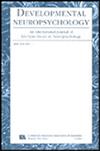家长报告的妥瑞症儿童睡眠障碍和日常执行功能障碍。
IF 2.2
4区 心理学
Q3 PSYCHOLOGY
Developmental Neuropsychology
Pub Date : 2024-01-01
Epub Date: 2024-02-01
DOI:10.1080/87565641.2023.2300428
引用次数: 0
摘要
图雷特综合征(TS)是一种以抽搐为特征的神经发育性疾病,识别和治疗图雷特综合征(TS)患者睡眠障碍的需求与日俱增。本研究通过家长报告量表和开放式问题,对 TS 患儿(136 人)和神经正常对照组(101 人)的睡眠、抽动和执行功能进行了调查。85%的 TS 患儿的睡眠障碍评分在临床范围内。抽搐严重程度越高,预示睡眠障碍和执行困难越严重。定性分析结果表明,睡眠与抽搐之间存在双向联系,值得在临床环境中加以考虑。还需要进一步的研究来探索因果关系。本文章由计算机程序翻译,如有差异,请以英文原文为准。
Parent-Report Sleep Disturbances and Everyday Executive Functioning Difficulties in Children with Tourette Syndrome.
There is an increasing need to identify and treat sleep disturbances in Tourette syndrome (TS), a neurodevelopmental condition characterized by tics. This study explored sleep, tics, and executive functioning in children with TS (n=136) and neurotypical controls (n=101) through parent-report scales and open-ended questions. 85% of children with TS scored in the clinical range for a sleep disorder. Higher tic severity predicted increased sleep disturbances and executive difficulties. Qualitative insights indicated a bidirectional link between sleep and tics, which warrants consideration in clinical settings. Further research is needed to explore causal links.
求助全文
通过发布文献求助,成功后即可免费获取论文全文。
去求助
来源期刊
CiteScore
2.80
自引率
6.70%
发文量
17
审稿时长
>12 weeks
期刊介绍:
Devoted to exploring relationships between brain and behavior across the life span, Developmental Neuropsychology publishes scholarly papers on the appearance and development of behavioral functions, such as language, perception, and social, motivational and cognitive processes as they relate to brain functions and structures. Appropriate subjects include studies of changes in cognitive function—brain structure relationships across a time period, early cognitive behaviors in normal and brain-damaged children, plasticity and recovery of function after early brain damage, the development of complex cognitive and motor skills, and specific and nonspecific disturbances, such as learning disabilities, mental retardation, schizophrenia, stuttering, and developmental aphasia. In the gerontologic areas, relevant subjects include neuropsychological analyses of normal age-related changes in brain and behavioral functions, such as sensory, motor, cognitive, and adaptive abilities; studies of age-related diseases of the nervous system; and recovery of function in later life.
Empirical studies, research reviews, case reports, critical commentaries, and book reviews are featured in each issue. By publishing both basic and clinical studies of the developing and aging brain, the journal encourages additional scholarly work that advances understanding of the field of lifespan developmental neuropsychology.

 求助内容:
求助内容: 应助结果提醒方式:
应助结果提醒方式:


